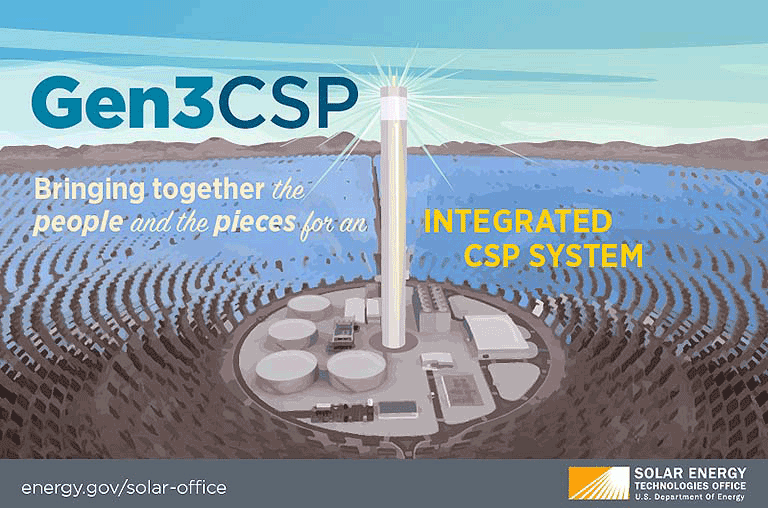New CSP Funding Is Getting Hotter
In May, the U.S. Department of Energy Solar Energy Technologies Office (SETO) announced $72 million to advance the next generation of concentrating solar power (CSP) research. Of these award recipients, NREL is leading two key projects and supporting two others with industry.

Compared to other renewable energy technologies, a unique feature of CSP is the ability to store heated material in an inexpensive and efficient thermal energy storage (TES) system. The stored thermal energy can be tapped continuously, regardless of weather, to provide renewable electricity on demand.
"These projects will help to continue the substantial cost reductions we've seen from the CSP industry during the past several years," said Mark Mehos, manager of the NREL Thermal Systems research team. "Working closely with our laboratory and industrial partners, we can help lower the cost of a CSP system by nearly 40% toward DOE's 2030 cost goals of $0.05 per kWh for baseload configurations. It's exciting for NREL to be playing such a key role in this research."
In the first project, Senior Engineer Craig Turchi is leading a multimillion dollar project that will design, develop, test, and validate an integrated, Gen3 CSP system. The initial award of $7 million covers design and small-scale testing. If selected for demonstration, the project team will construct and test a 2-megawatt (thermal) liquid-phase system consisting of the solar receiver, TES unit, primary heat exchanger, and associated pumps, piping, valves, sensors, and heat tracing.
The first phase of the project will assess two heat-transfer fluids: a ternary Mg/Na/K-chloride salt and liquid sodium, before down-selection to a single, integrated design for Phase 3.
Molten Chloride Thermophysical Properties, Chemical Optimization, and Purification Project
Judith Vidal is leading a $1-million project that will create and publish guidelines and protocols for obtaining accurate and reliable thermophysical properties. NREL will address drying/purification, chemical composition optimization, and handling of commercial molten chlorides used as heat-transfer fluid (HTF) and thermal energy storage (TES) materials for CSP applications.
One goal is to develop, validate, and publish protocols and national/international guidelines for handling, preparing, and testing hygroscopic molten salts.
Partnership with Brayton Energy
Mike Wagner is co-leading a project with Brayton Energy, a Gen3 Gas Phase System Development and Demonstration. The initial award of $7.6 million — including $1.7 to NREL — provides for development of a high-temperature, heat absorbing system that uses high-pressure carbon dioxide as the HTF and inexpensive solid particles as the TES media. The goal of the project is to achieve the high temperature conditions required by the supercritical carbon dioxide power cycle while circumventing the materials and efficiency challenges of alternative technologies. NREL will develop optical and thermal performance models and design the particle storage system. If successful, the technology will be demonstrated by a new 2 MWt test facility at SolarTAC in Arvada, Colo.
Partnership with Sandia National Laboratories
Zhiwen Ma is leading NREL's collaboration with Sandia National Laboratories on its particle pathway project.
All four of these projects are funded through SETO's Generation 3 CSP (Gen3 CSP) program. A test facility will be built that integrates thermal energy storage and can efficiently receive solar heat and deliver it to a working fluid at temperatures greater than 700 °C. Teams will pursue integrated solutions for either a gas, liquid, or solid pathway and through a rigorous selection process one awardee will be chosen to construct their proposed facility. Alongside this work, eight organizations have been selected to develop either component-level technology or utilize unique cross-cutting research capabilities that support the creation of a successful integrated testing site.
About NREL
NREL is the U.S. Department of Energy's primary national laboratory for renewable energy and energy efficiency research and development. NREL is operated for the Energy Department by The Alliance for Sustainable Energy, LLC.
About the Solar Energy Technologies Office
The U.S. Department of Energy Solar Energy Technologies Office supports early-stage research and development to improve the affordability, reliability, and performance of solar technologies on the grid. Learn more at energy.gov/solar-office.
Last Updated May 28, 2025
